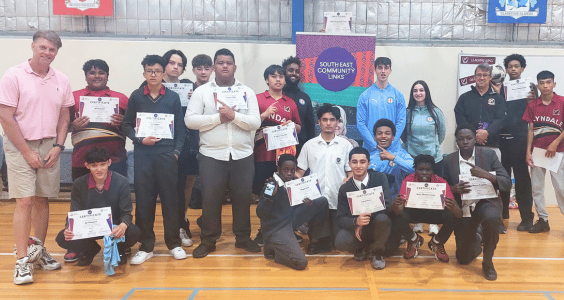Background
In 2024, South East Community Links (SECL) continued its Nurturing Healthy Masculinity program with a new group of Year 8 and Year 9 boys at Lyndale Secondary College. Building on the success of earlier sessions with senior students, this program aimed to engage a younger cohort to explore how early interventions could help shape positive identities and support long-term wellbeing. in partnership with Jesuit Social Services, the program was co-designed with school staff, focusing on reflection, emotional literacy, and respectful relationships equipping young men with tools to better understand themselves and those around them.
Key Activities
Over 15 weeks across two terms, 14 boys joined weekly one-hour sessions combining open conversations, hands-on activities, and real-world role models. With facilitation by SECL and Jesuit Social Services, the program addressed tough but important topics: mental health, harmful online influences, gender stereotypes, LGBTIQA+ inclusion, and violence against women. Participants explored what it truly means to “be a man” in today’s world, reflecting on how cultural and social pressures shape their attitudes and actions. Case studies and scenarios helped build empathy, while group activities developed practical skills like conflict resolution, respectful communication, and safely standing up for others.
A standout moment came when students connected live with a Kids Helpline counsellor, an experience that helped normalise seeking help and speaking about emotions. The boys asked honest questions and learned what real support looks like, shifting their mindset around vulnerability and strength. The program also welcomed two inspiring guest speakers – an Afghan community leader and a former AFL player, Majak Daw, who shared personal journeys of migration, racism, mental health challenges, and recovery. These stories deeply resonated, giving students role models who reflected their own experiences.
Outcomes

Increased their understanding of how emotions affect their thoughts and actions.

Learned more ways to handle problems without resorting to violence.

Increased awareness of the different pressures men face to be a certain way.

Gained a clearer understanding of how to support someone experiencing harm.

Improved recognition of harmful or toxic relationships signs.

Developed a deeper understanding of how violence against women and girls is shaped by gender inequality.

Increased awareness of where to get help for themselves or others.

Increased confidence reaching out for support when facing negative thoughts or harmful behaviours.
This program is funded under Supporting Multicultural and Faith-Based Communities to Prevent Family Violence by the Victorian Government Department of Premier and Cabinet.
